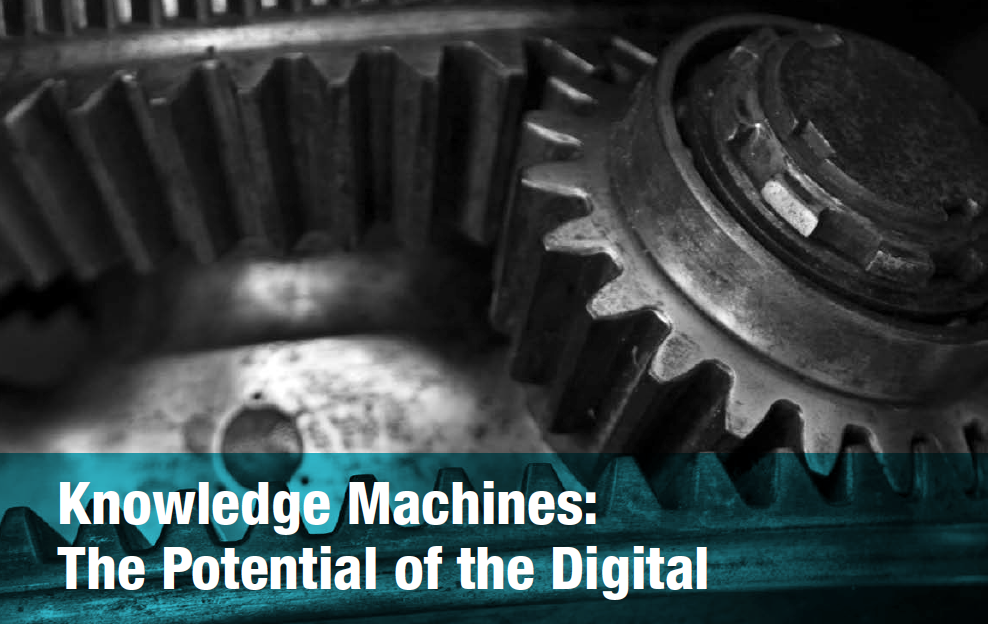On the 27th of September of this year, the Centre for Disruptive Media teamed up with Kent’s TEEME programme to host Knowledge Machines: The Potential of the Digital. A Symposium on Alternative Practices for Humanities Research, at the University of Kent. A conference report is now available which you can find underneath. The video recordings of the keynote lectures are available on the wiki and have also been embedded here. The keynote lectures were delivered by Julianne Nyhan (UCL), Gary Hall (Coventry University) and Alixe Bovey (University of Kent). These videos are available on a CC-BY-NC-ND license.
Conference Report
On 27th September, the University of Kent hosted Knowledge Machines, a one-day symposium that showcased different approaches to using digital methodologies in the humanities. A collaboration between Kent’s TEEME programme and Coventry University’s Centre for Disruptive Media, the event was a somewhat unlikely collaboration, bringing together Renaissance research and disruptive digital technologies. That was, however, precisely its aimto explore unlikely connections and collaborations, and hopefully entice alternative practices in the humanities.
Knowledge Machines sought to acknowledge, but also to move away from the discourse of crisis and negativity that is currently encompassing the field of humanities. It showed that multidisciplinary cooperation is breaking down field-specific boundaries within institutions of knowledge and cultural production, and creating more scope for affirmative engagement between the digital sphere and the traditional Humanities.
The day was divided into three major themes: digital humanities, posthumanities and collaborative humanities. What bound these together was a focus on the way we do scholarship and how new digital tools and methodologies are changing research practices. The three keynote speakers, Julianne Nyhan of UCL, Gary Hall of Coventry University, and Alixe Bovey of the University of Kent, gave introductory presentations about these three topics, and raised important questions on the current state of the field, as well as proposing alternative modes of operation that could transform the creative gridlock humanities scholars sometimes face. All the lectures are currently online at the “videos” section of the project’s wiki, for you to see here at: http://blogs.kent.ac.uk/knowledge-machines/videos
All three intriguing keynotes showed that old systems and epistemologies are currently changing and how potentially promising this change may be. Some radical reappraisals of scholarly practices were suggested and new models of thought and practice were addressed. We were reminded that the humanities with the help of the digital (as well as vice versa), could act as a disruptive force. We were also reminded that there is a need for a more pronounced interconnectivity not only between scholars within the Humanities, but also across disciplinary boundaries, through collaborative scholarship.
The keynote lectures were followed by a series of showcases in which participants presented projects that illustrated the practical outcome of the event’s three main topics. Six separate presentations took the attendants deeper into the possibilities of digital, post and collaborative humanities, by showcasing examples as diverse as manuscript digitising and the building of a digital dance archive.
The attendants of the symposium came from a large selection of backgrounds. Along with people working in Digital Humanities, media studies, or performance studies, we welcomed early modernists and medievalists, and other seemingly more “traditional” humanities researchers. The lively and stimulating discussions focused on subjects as diverse as open access publishing, digital humanities and disability, and the definition of the book.
One of the major areas of overlap were questions about the formal aspects of the book, both authorial and textual and as the discussion unfolded, historical and present practices yet again benefited from mutual elucidation and proved to be more connected than we often assume. For instance, early modern print culture involved collaborative writing processes as well as reading practices. Readers often bound different texts together along thematic lines, thereby making their own personal book. Authors were freely “remixing” past books, sometimes by continuing a past story, or by fragmenting and reassembling found texts. Such practices are currently reappearing, which Knowledge Machines showed by exploring how new opportunities to engage with past books are appearing in a digital environment. For example, materials can now be provided more widely through open access, digitised sources; collaboration is now more open via the “liquid books” project or ‘wikis’, which form fluid publications which are continually being edited and updated. “Doc Explore“, one of the projects presented, for instance, allows the use of digitised images from manuscripts from Canterbury and Rouen archives, to which the user can append their own notes, or even “remix” the manuscript pages into a new order, effectively making a singular presentation copy out of fragmented pieces of the past, without actually interfering with the original historical object. The showcases raised issues of what all this means for our idea of authorship, and intellectual property.
One of the things machines primarily are is connective and the results of the symposium are most visible in the new connections we made, but also in the future ones we will be making. The project’s wiki – a digital resource that aims to stimulate discussion, cooperation and a sense of community that reaches beyond the confines of a temporally bound event is still accessible to add your own resources to. It also holds all the participants’ presentations, materials and videos, which you can access, edit, and comment on by visiting: http://blogs.kent.ac.uk/knowledge-machines/how-to-use-this-wiki
– Martina Pranic, Kate De Rycker, Janneke Adema

